8+ SAMPLE Website License Agreement
-
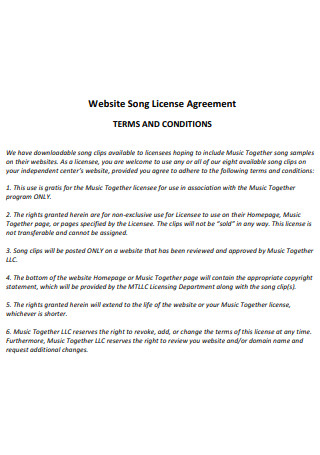
Website Song License Agreement
download now -
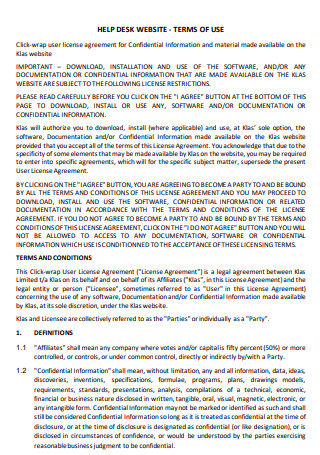
Help Desk Website License Agreement
download now -
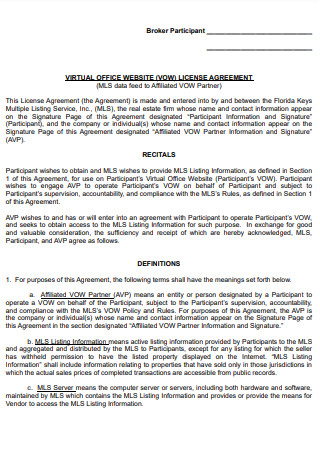
Virtual Office Website License Agreement
download now -
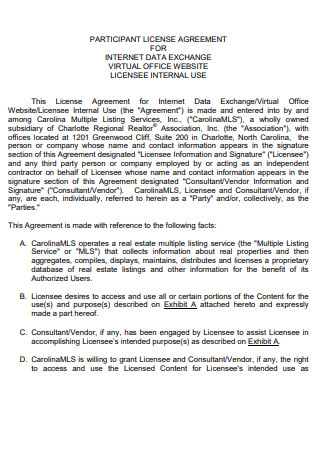
Website Participant License Agreement
download now -
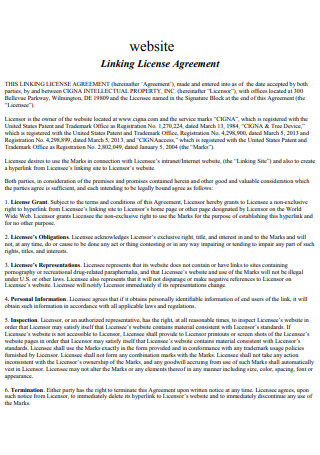
Website Linking License Agreement
download now -
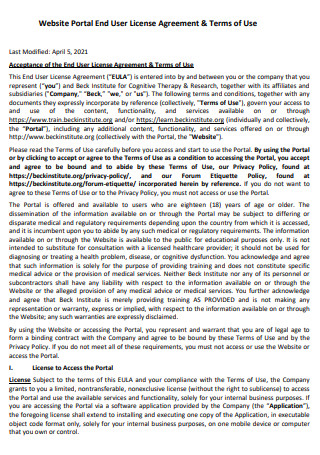
Website Portal End User License Agreement
download now -
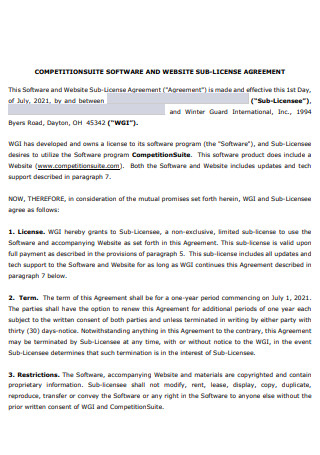
Website Sub License Agreement
download now -
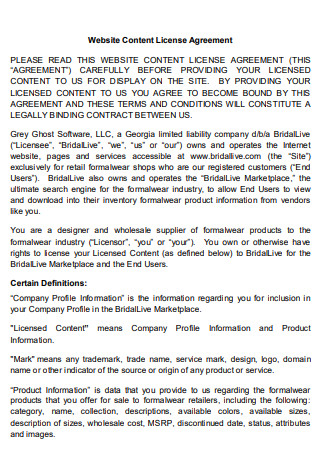
Website Content License Agreement
download now -
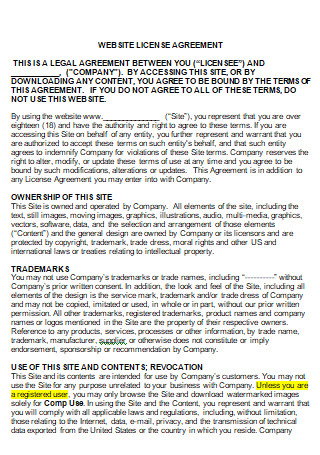
Website License Agreement Example
download now
FREE Website License Agreement s to Download
8+ SAMPLE Website License Agreement
What Is a Licensing Agreement?
Benefits of Licensing Agreement
Elements of an Agreement
Tips for Constructing a Powerful Commercial Website
How to Negotiate a Licensing Agreement
FAQs
What are the risks of being a licensee?
Is a license a contract?
How long does a licensee last?
What Is a Licensing Agreement?
A licensing agreement is a legal, written contract between two parties in which the owner of a brand, patent, or trademark permits another party to use it. The agreement, which is made between the licensor and the licensee, says what kind of license it is, how it can be used, and how the licensor will be paid. The type of contract depends on what is being licensed. Licensing agreements also stop arguments about sales budgets, quality issues, and royalties.
Benefits of Licensing Agreement
The guidelines, rules, and conditions that govern the use of the licensor’s brand, patent, or trademark are explicitly outlined in licensing agreements. Both the licensor and licensee are entirely aware of their obligations and responsibilities. This includes when and how much payment is due, any additional royalties that may be owed due to the relationship, the type of agreement, the length of time the licensee may use the property, copyright concerns, and the expiration date of the contract. Establishing a contract saves time, money, and hassles. For instance, if a person decides to use a trademark without a license, they may be prosecuted by the property owner, resulting in legal disputes, court fees, and wasted time. Contracts enable licensors to maintain a high level of control over their property and gain access to additional markets. A licensor can, for instance, prescribe how their property is marketed. And it enables them to access new markets through the licensee without establishing a physical presence there.
Elements of an Agreement
Once you formally negotiate a contract to license your technology, you must be ready to discuss a license agreement’s specific terms and conditions. Whether the license is for merchandising an entertainment property, exploiting a particular technology, or distributing a specific product to an original equipment manufacturer (OEM) or value-added reseller, these provisions vary (VAR). Generally speaking, a well-written license agreement should resolve the following issues:
Tips for Constructing a Powerful Commercial Website
When you have a website, you must adhere to specific rules and regulations to ensure it is legally compliant and reduce the risk of legal issues. Before launching a website, there are several fundamental legal requirements, ranging from copyright to responsibilities regarding avoiding plagiarism. With that settled, let’s move on to the advice!
1. Ensure That You Can Use All Content Legally
Depending on what you want to put on your website, you may need to get a license to use that content. This is essential if you want to avoid plagiarism, see the talents of others, and appreciate their work. You may have to sign an agreement before you can get the license. In this case, carefully read the fine print and know how to use the image and under what conditions.
2. Include a Privacy Statement
A privacy policy is one of a website’s most important legal requirements in the future. This policy clarifies how you will use the information about your visitors. A privacy policy is a big part of the law in some countries and helps build trust with your visitors.
3. Include a Page with Terms and Conditions
Even though the Terms and Conditions page seems to be the saddest page on the whole site, it is still essential. Even though it might not be legally necessary for some places, you should add it to your website just to be safe. This page is helpful if a customer has taken you to court and you want to limit your liability. In this case, your website’s Terms and Conditions page protects your right to your posted content.
4. Adhere to a Stringent Security Policy
Any breach in your website’s security can increase the likelihood that your entire organization will suffer losses. These days, security breaches are increasingly prevalent. Since the types of security breaches vary depending on your domain and niche market, you must carefully construct security action plans that match the needs of your website and strengthen its vulnerabilities. Create a strict security strategic plan and a contingency plan in case of a breach. It will instill confidence in your visitors that their information is secure with you.
5. Include Any Relevant Disclaimers
Sometimes, problems arise when websites force users to be sure about something that could result in a catastrophic loss. If your website is causing them harm, you, as the website’s proprietor, are liable for the entire situation. Therefore, you should include disclaimers on your website in case of omissions or errors or if you use links from third parties.
How to Negotiate a Licensing Agreement
Time is required to negotiate a license agreement, more time than you would like. Every transaction is unique, but in my experience, the negotiation procedure remains constant. You may feel disadvantaged when negotiating with a powerful corporation if you are an independent product developer. However, this is not necessary. Follow these measures to reach the best possible agreement.
1. Get Your Work Done
Before beginning negotiations, you must comprehend the licensee’s business. What are the company’s greatest assets? What are its shortcomings? What is it selling? How much? Where? Are its products sold in supermarkets, convenience stores, and specialty shops? Companies need to do it all. The company will only request some things. The greater your understanding, the greater your ability to negotiate from a position of strength. Knowledge is strength.
2. Start with a Term Sheet
If you cannot concur on the big picture, it will be impossible to negotiate a contract. Does the organization desire exclusivity? What regarding territories? What is the royalty rate? At this stage, you are evaluating each other. How well will you be able to collaborate? Begin negotiating a contract only after you and the other party have agreed to a broad set of terms. Manage your expectations as well. Obligations are hideous. They account for every possible issue. If you are unfamiliar with their format, you may become frustrated when you receive one.
3. Be Patient
As stated previously, negotiating a license agreement is a time-consuming process. Strive to accept that as accurate. There are so many aspects to deal with that it is impossible to do so simultaneously. Let’s begin with the most superficial elements first to gain momentum. Later, when you’re exhausted and eager for the process to be over, it will be simpler to convince your licensee to agree. The company has already invested its time at that juncture. Time is actually on your side. It would help if you had time for reflection. Be wary of businesses that attempt to coerce you into signing a contract immediately.
4. Adopt a Win-Win Perspective
Be a good teammate. People will want to collaborate with you if you can find a way to remain optimistic during the conflict. And this is significant because there’s a good possibility you’ll work with the same individuals you’ve debated after the contract is signed. Set the tone from the outset by declaring your commitment to the business partnership agreement and your eagerness to see it succeed.
5. Take up the Phone More than Less Often
Email can only do some things. If something in the contract needs to be discussed more, I don’t hesitate to call the company and let them know. If I’m lucky, they’ll immediately agree to put the words I want in the document. That’s why it’s good to use the phone. In the past, this has worked well for me.
FAQs
What are the risks of being a licensee?
As a licensee, your objective is to maximize the value of the intellectual property you have just paid to use. The risk is that the licensing agreement may conflict with or even thwart this objective. For this reason, the licensee places equal importance on the license’s scope.
Is a license a contract?
In contrast, licenses granted under the Act only exist once the applicant has accepted the terms and signed a contract with the grantor. Consequently, the License was more than just a contractual agreement; it also granted a land interest.
How long does a licensee last?
An applicant for a personal licence must apply to the licensing authority in their usual residence. A license is valid for ten years unless surrendered or lost before expiration. Upon expiration, the option exists to renew the license for an additional ten years.
If you want to use someone else’s intellectual property, you must negotiate a licensing agreement with that party. You will likely need the assistance of an attorney to protect your interests and those of the property owner. You may have to spend money to have the agreement drafted, but by doing so, you ensure that your financial assets and business are protected and that your relationship with the licensor will run smoothly.
